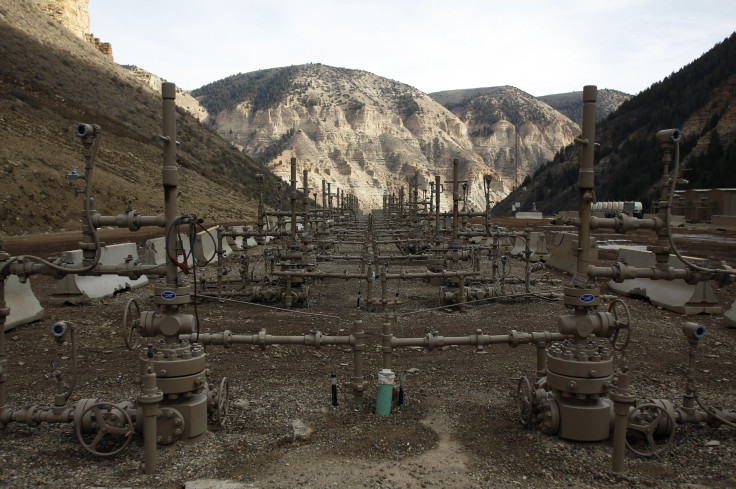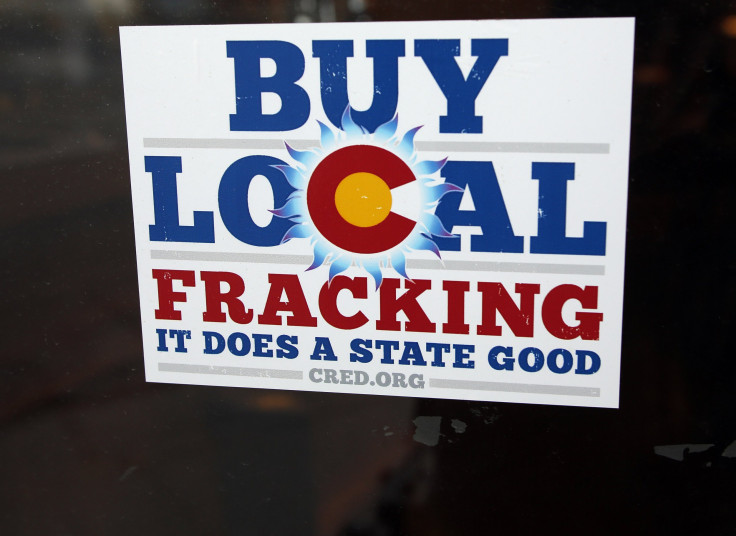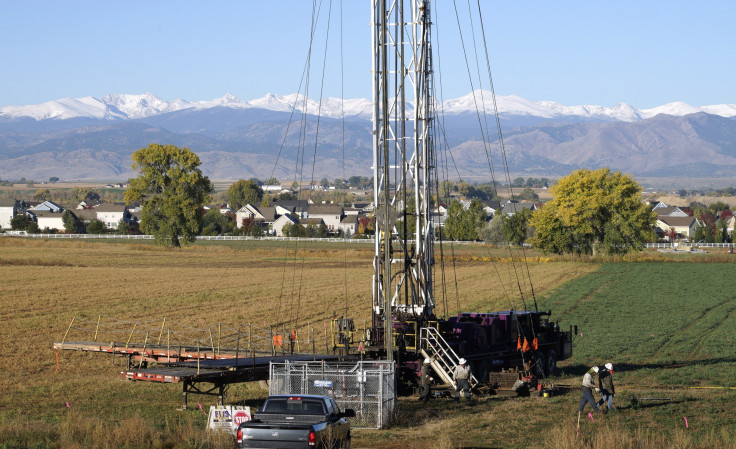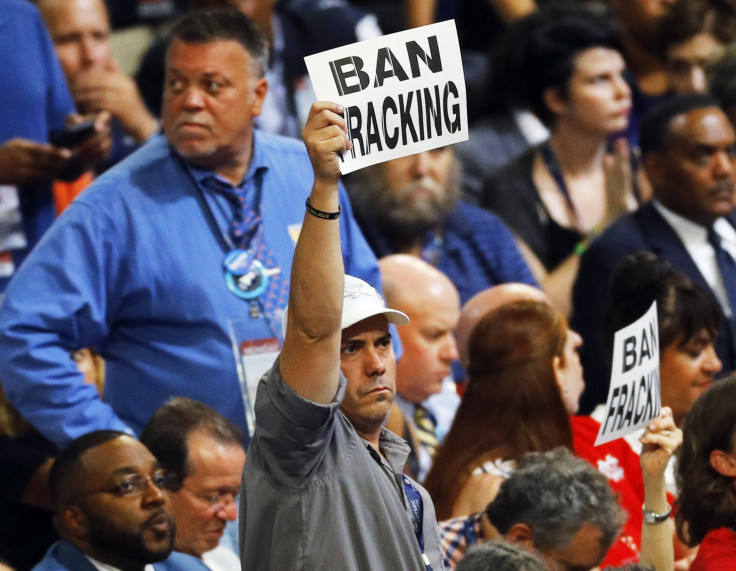Oil And Gas Industry Power Builds Wells Near Schools In Colorado, Trumping Environmental Concerns

The political power of the oil and gas industry has been on display in Colorado this Spring. When an explosion earlier this month incinerated two men in a Colorado home near an aging oil well, the catastrophe could have prompted lawmakers to pass an initiative forcing the oil and gas industry to site such wells farther away from schools. But it was too late: Only days before the disaster, Republican lawmakers bankrolled by fossil fuel industry corporations had killed the bill to do just that.
The legislation passed Colorado’s Democratic-controlled House just after a University of Colorado study suggested a possible link between child cancer rates and proximity to oil and gas sites. Despite that, the Republican-controlled upper chamber voted the measure down — only months after the state Senate GOP was raking in five- and six-figure checks from major oil and gas corporations operating in the state.
An International Business Times review of campaign finance data found that individual and corporate donors from the oil and gas industry pumped more than $738,000 into Colorado Republican senators’ election fund during the 2016 election cycle, which immediately preceded GOP lawmakers’ move to kill the setback bill. In total, oil and gas industry donations comprised nearly a third of all the cash the fund pulled in during the election. The donations included a $45,000 contribution from Anadarko, whose well exploded in mid-April and which this week said it is shutting down 3,000 vertical wells across northeastern Colorado. The shutdown news sent Anadarko stock plummeting 7.5 percent in less than 24 hours.
IBT reviewed campaign finance records compiled by the nonpartisan National Institute on Money in State Politics. Those records showed that the hundreds of thousands of dollars from the oil and gas industry flowed to the Senate Majority Fund, whose website says it is “dedicated to retaining a Republican majority in the Colorado Senate.” In all, since the 2014 election when the GOP took back the Colorado Senate, the oil and gas industry has delivered $1.1 million to the Senate Majority Fund, and a total of $1.25 million to Colorado Republican Party committees. Over the same period, oil and gas interests gave just $16,235 to Democratic Party committees in the state.

Many of the largest donations to the Senate Majority Fund came from firms that only months later directly lobbied against the setback legislation, according to state documents reviewed by IBT.
“The oil and gas industry has a stranglehold on the Capitol right now,” Democratic Rep. Mike Foote, who introduced the bill, told IBT. “If they oppose a bill, no matter how reasonable, every Republican will vote against it. Simply put, that’s the only reason why our school setbacks bill did not pass.”
The Colorado Senate Republicans’ office did not respond to a request for comment for this story. Neither did Senate President Kevin Grantham, or Jerry Sonnenberg, the Republican chair of the Senate Agriculture, Natural Resources and Energy Committee that killed the setback legislation. Committee Vice Chairman Randy Baumgardner, a Republican, declined to comment.
Business interests that opposed the legislation argued that the setback measure was unnecessary because current rules already require oil and gas wells to be placed 1,000 feet from schools. Foote’s bill, they asserted, would simply require that new wells be placed 1,000 feet from the school property lines, not the buildings themselves.
“The regulations put in place by the Colorado Oil and Gas Conservation Commission in 2013 addressed groundwater, methane capture and setbacks — which are already set at 1,000 feet from high-occupancy buildings like schools,” said Denver Metro Chamber of Commerce President and CEO Kelly Brough in a statement. “This bill undermines the work of the commission and the regulations developed and duplicates setbacks from schools that are already in place.”
Studies Fuel Fears About Potential Health Hazards
Throughout the country, environmentalists and the oil and gas industry have squared off over fracking, which has boosted domestic oil and gas production and allowed the U.S. to shrink oil imports from 65 percent of daily demand in 2005 to 28 percent in 2015. Earlier this month, Maryland banned fracking, following New York, which banned the practice in 2014 citing “significant public health risks.”
Much of the opposition to fossil fuel development has been spurred by a spate of studies raising public health concerns. They include:
-A 2016 study by Johns Hopkins researchers finding that patients were 1.5 to four times more likely to have asthma attacks if they live near fracking wells.
-A 2015 study by University of Pennsylvania and Columbia University researchers finding that fracking areas in Pennsylvania had a 27 percent higher rate of hospitalization than nearby counties where fracking did not occur.
-A 2015 report by the EPA asserting that fracking did have the potential to impact drinking water, and identifying several instances of contaminated drinking water wells. The report, however, said there was no evidence of “widespread, systemic impacts on drinking water resources in the United States.”
-A 2014 study by academic researchers linking fracking to “infertility, miscarriage or spontaneous abortion, impaired fetal growth” and low birth weight.
-A 2014 academic study finding levels of eight poisonous chemicals near fracking sites in Colorado, Pennsylvania, Arkansas, Ohio and Wyoming, that were far greater than federal limits.
The oil and gas industry has disputed many of these findings.
“Evidence of contamination is highly anecdotal and often overblown by the exaggeration often associated with litigation,” fossil fuel industry lobbyist Scott H. Segal told the New York Times in response to the EPA drinking water study. “The vast majority of third-party professional organizations and governmental officials have found shale development to be highly consistent with environmental protection and energy policy objectives.”
“A Very Commonsense Step”
The April blast in Firestone, Colorado, has rekindled the debate over safety. While the cause of the explosion remains unknown, it followed a spill at an Anadarko oil well that caused 28,000 gallons of oil, gas and drilling waste water to spray across an area 2,000 feet long and 1,000 feet wide northeast of Denver.
These mishaps have occurred as fights over fossil fuel exploration have intensified in Colorado, home to the Mancos Shale formation, which was recently estimated to hold 40 times more natural gas than previously thought. The U.S. Geological survey said in June the formation is potentially the second-largest in the country, and home to 66.3 trillion cubic feet of gas.
Colorado’s political battle over oil and gas has become a conflict about state and municipal authority. In May last year, the Colorado Supreme Court struck down several local fracking bans, ruling the bans were preempted by state law. This year, Colorado Attorney General Cynthia Coffman — whose campaigns have been supported by groups funded by the oil and gas industry — filed a lawsuit against Boulder County after lawmakers there continued to issue moratoriums against fracking.
But the Colorado Court of Appeals last month changed the mandate of the state commission charged with regulating oil and gas industry. Overturning a lower court decision, the Appeals Court ruled the Colorado Oil and Gas Conservation Commission is required to not just balance industry and environmental interests, but ensure the “protection of public health, safety, and welfare, including protection of the environment and wildlife resources.”

Amid the back and forth, Foote this year proposed state legislation that would have required oil and gas wells be placed at least 1,000 feet from schools and other “high-occupancy buildings.” Foote’s bill would have clarified the rule to explicitly state that the 1,000 foot limit would began at school property lines, not the school building itself. Environmental groups, teachers unions and county and city governments all lobbied in support of the bill.
“We saw that bill as a very common sense step to take in order to protect communities from oil and gas drilling. In our minds it was a simple clarification bill,” Jessica Goad, spokesperson for Conservation Colorado told IBT. “The industry says it wants to balance oil and gas interests with the interests of communities. In that vein, we assumed it would pass.”
According to a report on Foote’s bill from the Colorado Legislative Council, which is the nonpartisan research arm of the state’s General Assembly, “the increased surface area of land that will be removed from siting new operations is small, and any reduction in revenue as a result is expected to be minimal.”
That assessment, though, did not tamp down the oil and gas industry’s furious efforts to block it.
State lobbying records reviewed by IBT show that many of the biggest oil and gas interests donating to groups supporting Colorado Senate Republicans specifically lobbied against the setback bill. Noble Energy, PDC Energy, Exxon, and Anadarko collectively gave more than $400,000 worth of direct corporate contributions to the Senate Majority Fund and the Colorado Republican Party in the 2016 election — just before those firms lobbied against the legislation. Noble Energy and Exxon also gave an additional $450,000 to the Republican State Leadership Committee, which funded a Colorado group that supported the Colorado Senate GOP’s efforts to preserve its majority in the upper chamber.
National groups also got involved in the lobbying against Foote’s setback bill — state records show the American Petroleum Institute and the National Federation of Independent Business worked against the legislation.
Oil and gas interests were not the only opponents of the bill; it also drew fire from the state’s agribusiness industry.
“Right now farmers work really well with those oil and gas companies,” Emily Ibach, the Farm Bureau’s director of public policy for state affairs told IBT. Rather than allowing gas and oil wells to be drilled at “the edge of the farming operation,” the bill would have required some new wells to be moved back to “the middle of the crop field, and that would take more acres out of production,” Ibach said. “That was our main concern.”
But it was worries about public health which led Sen. Irene Aguilar to co-sponsor Foote’s bill in the Senate.
“One of the many things that’s true about oil and gas development is it does affect ozone,” Aguilar, who is a physician, told IBT. “I was really thinking about keeping kids away from noise and fumes… additional protection for our kids seemed like a small thing to ask for.”
Despite the bill being killed in April, Colorado Democrats have moved onto their next battle against the oil and gas industry. Legislation co-sponsored by Foote would require oil and gas companies to document the scope of their “forced pooling,” a practice that has been called a “ form of corporate eminent domain” whereby landowners are effectively compelled to permit fossil fuel exploration on their property.

The forced pooling legislation recently passed the Colorado House, but now heads to the same Republican-controlled Senate that helped the oil and gas industry block the setback bill.
“We have a very well funded oil and gas lobby, 52 lobbyists when they need them. They also support candidates that are very much on their side, and almost always Republican,” said Democratic Sen. Matt Jones, who is pushing the bill in the upper chamber. “I think it’s an ongoing David and Goliath battle.”
In recent years, some environmental groups have considered trying to bypass the legislature and take their case directly to voters through ballot initiatives that would impose stricter regulations on oil and gas development.
That option, however, will now be less accessible thanks to many of the same Senate GOP donors who lobbied against the setback bill. In 2016, Anadarko and other oil and gas firms together donated $22 million to groups that successfully passed their own measure making it harder for grassroots groups to place their initiatives on the statewide ballot.
© Copyright IBTimes 2025. All rights reserved.






















